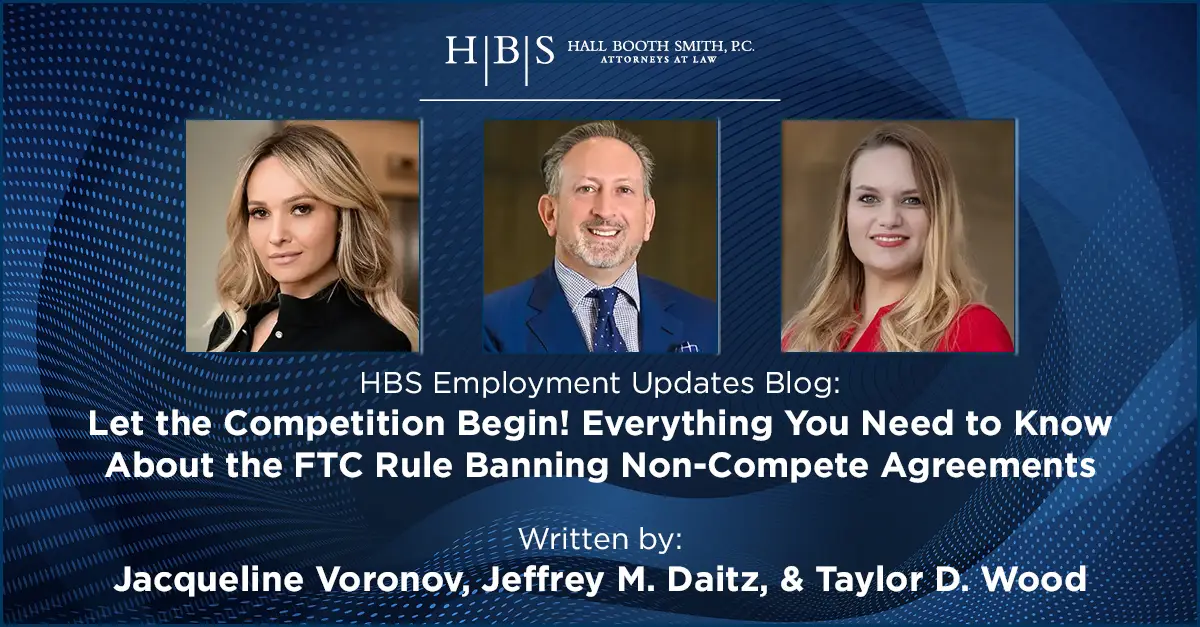
Let the Competition Begin! Everything You Need to Know About the FTC Rule Banning Non-Compete Agreements
Introduction
On April 23, 2024, the United States Federal Trade Commission (FTC) issued a sweeping final rule (the Rule) regarding the use of non-compete clauses in employment.
Under the FTC’s new Rule, employers will be prohibited from entering into future non-compete clauses/agreements for all employees at all levels and will render previous non-competes unenforceable as of its effective date, or 120 days after the Rule’s publication in the Federal Register.
What Are Non-Competes?
A non-compete is a clause or agreement which prevents an employee from taking a new job or engaging in a new business which is considered direct competition with their previous employer. These clauses/agreements are often used to protect an employer’s business, trade secrets, and proprietary information from employees who leave their place of employment.
Non-competes must outline many specific terms, including the business and/or activities the employee must refrain from, the duration of such restraint, and the geographic area in which the non-compete will apply.
What Does the FTC’s Final Rule Say?
The FTC’s Rule would ban almost all existing non-compete clauses and prohibit all new non-compete clauses. For purposes of the Rule, a non-compete clause is a “term or condition of employment that prohibits a worker from, penalizes a worker for, or functions to prevent a worker from: (i) seeking or accepting work in the United States with a different person where such work would begin after the conclusion of the employment that includes the term or condition; or (ii) operating a business in the United States after the conclusion of the employment that includes the term or condition.”
Future Non-Competes
Once the final Rule becomes effective, employers will be broadly prohibited from entering or attempting to enter non-competes, enforcing such clauses, and/or representing to any employee at any level that they will be subject to such a clause.
Current Non-Competes
Under the new Rule, current non-competes will be rendered legally invalid. Employers will be required to provide “clear and conspicuous notice” by the effective date of the Rule to all current or former employees subject to non-competes that their non-competes are legally unenforceable and that the employer will not seek to enforce such clause.
Such notices must include the employee and employer’s names, must be in writing, and must be delivered to the employee by accessible means, including paper mail, email, text message, or even phone calls. The FTC has proposed model language that employers can send should the Rule become effective.
Senior Executives Exception
The FTC has reasoned that non-competes with senior executives are not exploitative or coercive and that this subset of workers is less likely to be subject to the kind of acute, ongoing harms currently being suffered by other workers subject to existing non-competes. As such, existing non-compete agreements with senior executives will not be upset by the Rule.
The Final Rule defines “senior executives” to include either:
- a business entity’s president, Chief Executive Officer, or the equivalent, or
- an officer with “policy-making position, meaning any individual who earns more than $151,164 annually and has final authority to make controlling policy decisions on significant aspects of a business.” Workers who merely advise or exert influence over policy decisions do not have “policy-making authority.” The FTC release indicates that the definition for determining which workers have “policy-making authority” used here is similar to the SEC standard used to identify executive officers. “Total annual compensation” includes salary, commission, and non-discretionary bonuses/compensation.
Many executives, in what is often called the “C-suite,” will likely be senior executives if they are making decisions that have a significant impact on the business, such as important policies that affect most or all of the business. Partners in a business, such as physician partners of an independent physician practice, would also generally qualify as senior executives under the duties prong, assuming the partners have authority to make policy decisions about the business. The Commission notes that such partners would also likely fall under the sale of business exception in §910.3 if the partner leaves the practice and sells their shares of the practice. In contrast, a physician who works within a hospital system but does not have policy-making authority over the organization as a whole would not qualify.
As with all other employees, employers will be prohibited from entering into, enforcing (or attempting to enforce), or representing that a senior executive is subject to a non-compete after the Rule’s effective date. However, unlike other employees, those senior executives with existing non-competes, will remain subject to those provisions – despite FTC’s adoption of the new Rule.
Other Limited Exceptions
While the Rule is expansive, the FTC carved out limited exceptions to its Rule.
- First, under §910.3(a), the restriction on non-competes will not apply to the bona fide sales of a business, ownership interests or operating assets.
- Under §910.3(b), the FTC’s Rule will not apply “where a cause of action related to a non-compete clause accrued prior to the effective date.” In other words, the regulation does not make currently ongoing litigation seeking to enforce a non-compete unlawful.
- The third exception set forth in §910.3(c) relates to instances of “good faith,” where an employer enforces, attempts to enforce, or represents there is an applicable non-compete if that employer believes, in good faith, that the FTC’s Rule is inapplicable.
The final rule also does not cover franchisor/franchisee non-competes. Non-competes used in the context of franchisor/franchisee relationships remain subject to state common law and federal and state antitrust laws.
What About Non-Solicits & Confidentiality Agreements?
The FTC Rule stops short of any outright ban on non-solicit provisions, but it does provide that any “term or condition” of employment that “prohibits,” “penalizes,” or “functions to prevent a worker from” seeking or accepting work after their employment would fall under the definition of a “non-compete.”
Whether a particular non-solicit provision falls under this definition will no doubt be a very fact-specific inquiry to be resolved on a case-by-case basis. As for traditional non-disclosure agreements and confidentiality agreements, those are not affected by this Rule and are still fair game.
What About the Healthcare Industry?
Many commenters representing healthcare organizations and industry trade associations stated that the FTC should exclude some or all of the healthcare industry from the rule because they believe it is uniquely situated in various ways. The FTC declined to adopt an exception specifically for the healthcare industry. The FTC was not persuaded that the healthcare industry is uniquely situated in a way that justifies an exemption from the final rule.
What Happens If The Final Rule Is Violated?
The FTC may either pursue an “adjudication” (an administrative complaint that is filed against an organization and redressed by an administrative law judge) or seek an injunction in federal court under section 13(b).
The FTC cannot obtain civil penalties or other monetary relief against parties for violating the Rule, although it can obtain civil penalties in court if a party is ordered to cease and desist from a violation and fails to do so. Importantly, the FTC issued the Final Rule pursuant to the FTC Act, which does not provide for a private right of action for violations of the Act.
Although the Rule does not provide a private right of action, employees and competitors have the right to submit complaints to the FTC regarding noncompliance with the Final Rule, and the FTC has the authority to initiate investigations that are typically burdensome and costly. The FTC frequently issues civil investigative demands (CIDs) to investigation subjects to compel production of documents, data and information related to the investigation.
What Should Employers Do Now?
Although the Final Rule is a significant development and departure from existing law by treating most non-competes as per se illegal, it is still too premature for employees to rejoice or employers to panic. There is much uncertainty as to when, if ever, the Final Rule would become effective and enforceable as it is already facing legal challenges one day after the FTC finalized the rule.
Business groups led by the U.S. Chamber of Commerce filed suit against the FTC to block its non-compete ban, arguing that the agency lacks the authority to issue rules that regulate “unfair methods of competition.” In its complaint, the lobby group said that while the Federal Trade Commission Act granted the Agency the ability to challenge particular practices, it did not allow the Agency to promulgate “unfair methods of competition” rulemaking. The suit seeks to vacate and permanently enjoin the non-compete ban, among other forms of relief. Regardless of the outcome on the state court level, this will be an issue most certainly destined for the United States Supreme Court.
In the meantime, companies should begin taking steps to mitigate the heightened risks that will result from the FTC ban by implementing non-disclosure and non-solicitation agreements to provide protection against theft and disclosure of trade secrets and other confidential information. Companies should also consult with counsel to assess their existing use of non-competes and other restrictive covenants before the Final Rule’s effective date.
If the Final Rule does become effective, employers will be required to provide written notice to covered workers that their non-compete clauses are no longer in force by the effective date, which could be as early as August of this year.
For more information on the FTC’s new rule banning non-compete clauses and what it means for you or your organization, please contact a member of Hall Booth Smith’s Labor & Employment department.
Disclaimer
This material is provided for informational purposes only. It is not intended to constitute legal advice nor does it create a client-lawyer relationship between Hall Booth Smith, P.C. and any recipient. Recipients should consult with counsel before taking any actions based on the information contained within this material. This material may be considered attorney advertising in some jurisdictions. Prior results do not guarantee a similar outcome.
Blog Overview
About the Authors
Jacqueline Voronov
Partner | Paramus Office
T: 201.221.7014
E: jvoronov@hallboothsmith.com
Jacqueline Voronov’s litigation experience includes the defense of employers in single and multi-plaintiff actions on claims of wrongful discharge, sexual harassment, race, national origin, gender, disability, pregnancy and age discrimination, breach of restrictive covenants, family medical leave, failure to accommodate, retaliation, wage/hour laws, and related tort claims.
Jeffrey M. Daitz
Partner | Paramus Office
T: 201.221.7013
E: jdaitz@hallboothsmith.com
Jeffrey M. Daitz is co-chair of the Labor & Employment practice; and co-director of the Employment Practices Liability Insurance Defense Department. He has more than two decades of experience in employment law, labor management relations, and alternative dispute resolution.
Taylor D. Wood
Attorney at Law | Paramus Office
T: 201.614.6363
E: twood@hallboothsmith.com
Taylor D. Wood is an associate in our Paramus office and focuses her practice on labor and employment matters.






Leave a comment
You must be logged in to post a comment.